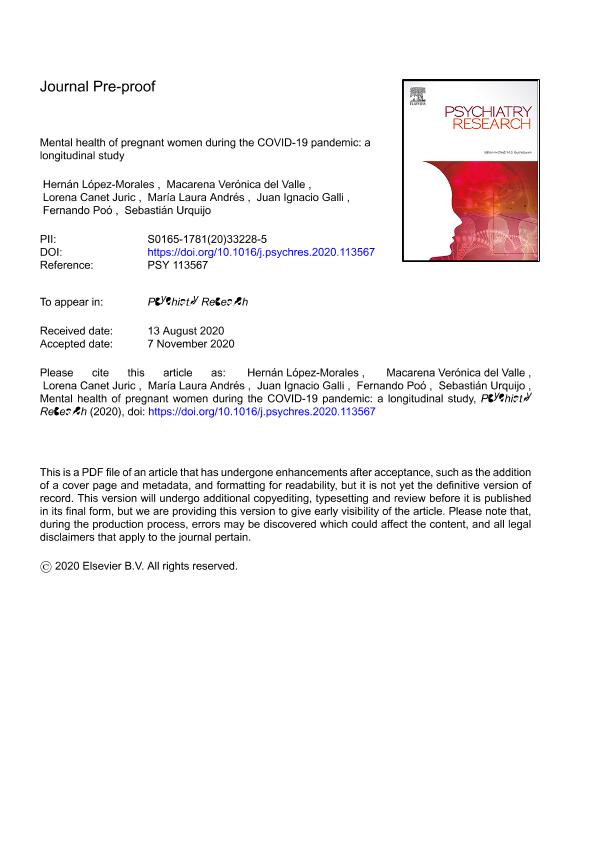Artículo
Mental health of pregnant women during the COVID-19 pandemic: a longitudinal study
López Morales, Hernán ; del Valle, Macarena Verónica; Canet Juric, Lorena
; del Valle, Macarena Verónica; Canet Juric, Lorena ; Andrés, María Laura
; Andrés, María Laura ; Galli, Juan Ignacio
; Galli, Juan Ignacio ; Poó, Fernando Martín
; Poó, Fernando Martín ; Urquijo, Sebastian
; Urquijo, Sebastian
 ; del Valle, Macarena Verónica; Canet Juric, Lorena
; del Valle, Macarena Verónica; Canet Juric, Lorena ; Andrés, María Laura
; Andrés, María Laura ; Galli, Juan Ignacio
; Galli, Juan Ignacio ; Poó, Fernando Martín
; Poó, Fernando Martín ; Urquijo, Sebastian
; Urquijo, Sebastian
Fecha de publicación:
11/2020
Editorial:
Elsevier Ireland
Revista:
Psychiatry Research
ISSN:
0165-1781
Idioma:
Inglés
Tipo de recurso:
Artículo publicado
Clasificación temática:
Resumen
Several studies have reported the susceptibility of pregnant women to emotional instability and stress. Thus, pregnancy may be a risk factor that could deepen the already negative effects of the current COVID-19 pandemic. Therefore, the aim of this study is to analyze longitudinally the psychopathological consequences of the pandemic in pregnant women, and to explore differences with non-pregnant women. The participants in this study were 102 pregnant women, and a control group of 102 non-pregnant women (most of them reported having university studies and little financial impact from the pandemic). They completed the Beck Depression Inventory-II, the State-Trait Anxiety Inventory, and the Positive and Negative Affect Schedule, in three different times (2, 14, and 47 days after the start of the lockdown). In a time range of 50 days of quarantine, all women showed a gradual increase in psychopathological indicators and a decrease in positive affect. Pregnant women showed a more pronounced increase in depression, anxiety and negative affect than the non-pregnant women did. In addition, pregnant women showed a more pronounced decrease in positive affect. It is important for institutions dedicated to perinatal health care to count on empirical information to optimize the provision of their services.
Palabras clave:
PREGNANCY
,
ISOLATION
,
LOCKDOWN
,
PRENATAL DEPRRESION
,
PRENATAL ANXIETY
,
STRESS
,
COVID-19
Archivos asociados
Licencia
Identificadores
Colecciones
Articulos(IPSIBAT)
Articulos de INSTITUTO DE PSICOLOGIA BASICA, APLICADA Y TECNOLOGIA
Articulos de INSTITUTO DE PSICOLOGIA BASICA, APLICADA Y TECNOLOGIA
Citación
López Morales, Hernán; del Valle, Macarena Verónica; Canet Juric, Lorena; Andrés, María Laura; Galli, Juan Ignacio; et al.; Mental health of pregnant women during the COVID-19 pandemic: a longitudinal study; Elsevier Ireland; Psychiatry Research; 2020; 113567; 11-2020; 1-32
Compartir
Altmétricas



